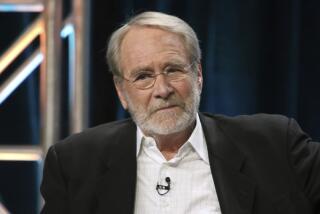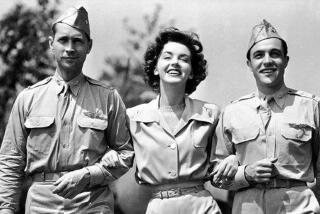Martin Ritt; Directed ‘Hud,’ ‘Norma Rae’
- Share via
Martin Ritt, the once blacklisted director who was highly respected for artistically tackling controversial social issues in about 25 films, died Saturday. He was 76.
Ritt died at Santa Monica Hospital of complications of heart disease, Directors Guild publicist Chuck Warn said.
“We learned a good deal about acting from Marty. We learned a good deal about style. But mostly, we learned a good deal about incorruptibility,” said Paul Newman and Joanne Woodward, whom he cast in several award-winning films.
“He changed my life as an actor and as a human being. He was my mentor and my friend and my father. He made me a better actor and a better human being and I loved him to the core,” said actress Sally Field, who won the Academy Award, among other honors, for “Norma Rae.”
Born and brought up on New York’s Lower East Side, Ritt won a football scholarship to college and envisioned becoming a coach or teacher. He went on to law school, but dropped out after Elia Kazan and a small Greenwich Village drama group got him into acting.
Serving in the Army during World War II, he made his directing debut with an all-soldier play called “Yellow Jack.”
Soon established in legitimate New York theater, Ritt switched to live television, directing about 100 shows and acting in about 150 teleplays.
But his burgeoning career was interrupted in the early 1950s when he was blacklisted by U.S. Sen. Joseph McCarthy as an uncooperative witness during McCarthy’s anti-Communist investigations.
“They wanted me to turn my friends in,” he told The Times in 1979. “A rat does that and has to live with it the rest of his life.”
Ritt supported his family by teaching at the Actors Studio, playing poker and betting on the horses at New York racetracks.
In 1956, Ritt broke out of his blacklist period when producer David Susskind hired him to direct “Edge of the City.” The film was a box-office failure but a critical success and Ritt was established as a respected movie director. He moved West.
Ritt followed his first film with “No Down Payment” starring Woodward and “The Long, Hot Summer,” which starred Newman.
In 1963, with Newman in the starring role, Ritt’s “Hud” earned four Academy Awards as well as a nomination for Ritt as best director.
Known as a director who preferred films that made statements, Ritt’s roster included “The Spy Who Came in From the Cold” in 1965; “The Molly Maguires” in 1970; “The Great White Hope” in 1970; “Sounder” in 1972; “Conrack” in 1974; “The Front” in 1976 and “Norma Rae” in 1979.
His recent films, starring Field, include “Back Roads” and “Murphy’s Romance.” His final film was “Stanley and Iris,” released this year.
“I’m still getting the same fulfillments, the same joys from the business,” he told The Times when he was 65. “But it gets tougher as you grow older.”
Ritt is survived by his wife of 53 years, Adele, a daughter, Martina Ritt Werner, and a son, Michael Ritt.
The family has requested that memorial donations be made to the Martin Ritt Scholarship Fund at the American Film Institute, 2021 N. Western Ave., Los Angeles, Calif., 90027.
A memorial service is scheduled for 2 p.m. Dec. 17 in the Directors Guild of America Theater, 7920 Sunset Blvd.
More to Read
Only good movies
Get the Indie Focus newsletter, Mark Olsen's weekly guide to the world of cinema.
You may occasionally receive promotional content from the Los Angeles Times.









